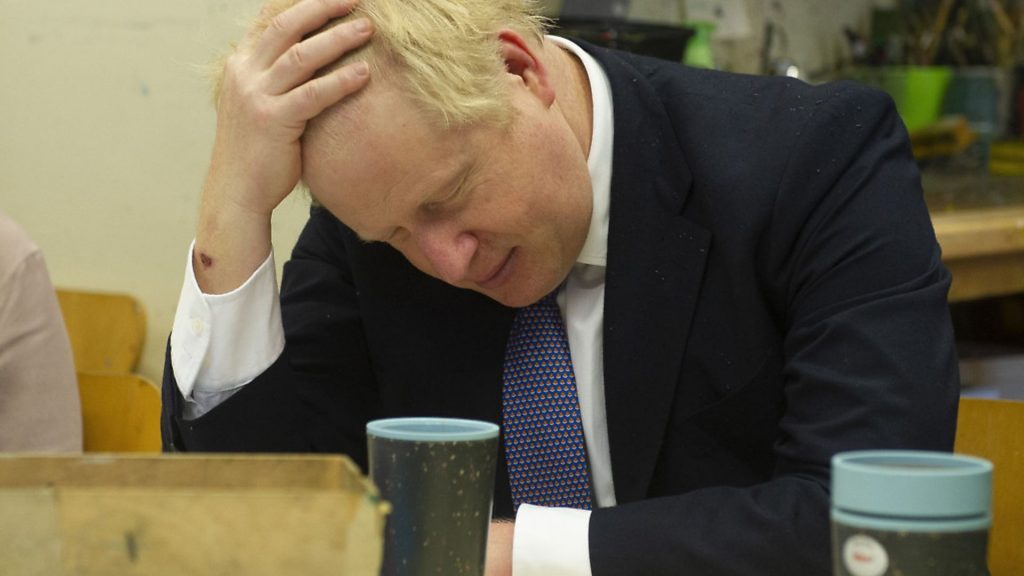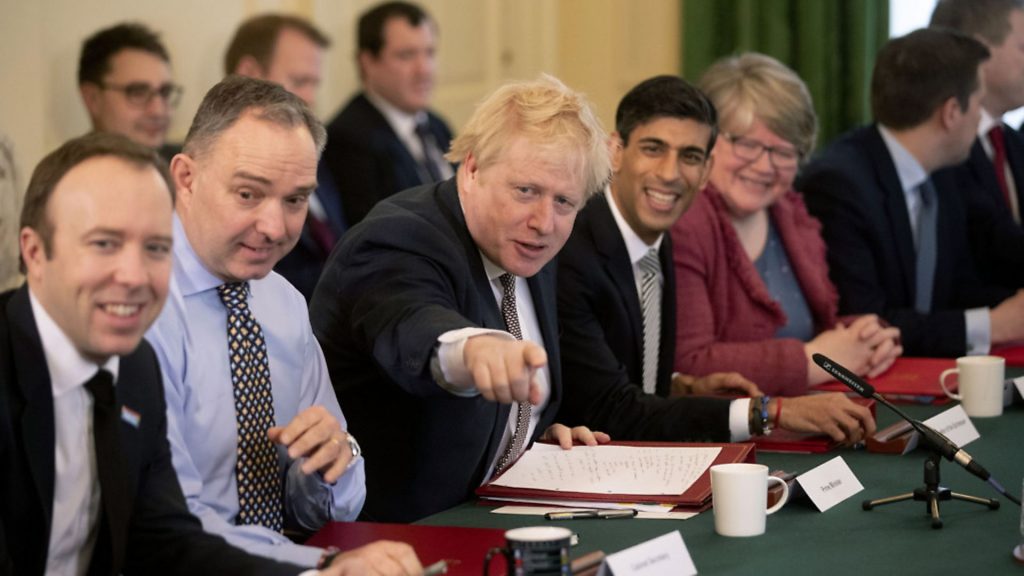
MICHAEL WHITE on the week government defined just who can come into the UK.
When Donald Trump pandered to a supporters’ rally by mocking Parasite, this year’s top Oscar winner – for the crime of being South Korean and needing sub-titles – the film’s distributors thumped the Tweeter-in-Chief with a retaliatory message: “Understandable: he can’t read.” The joke works better among bi-coastal liberals in California and New York than in the US heartlands, which probably preferred the president’s clunking: “What the hell was that about?”
Trump knows his market and, if the weekend result from Nevada is any guide – Bernie Sanders’ win, not boxer Tyson Fury’s – Democrats who hope to unseat him in November still don’t know theirs. What part of “Jeremy Corbyn” don’t senator Sanders’ campaign managers understand? With Keir Starmer heading towards a slow-motion victory in Labour’s leadership contest, even some Jezza fans finally seem to be tired of losing. Angry left-wing populists will always find themselves outbid by angry right-wing ones with fewer scruples.
Despite Starmer’s apparent (never under-estimate Momentum’s zealots) success, are we making the same mistake on politics’ self-styled progressive wing? The British equivalent of the Parasite tweet is the weekend report that Boris (“Where is he?”) Johnson is getting no more than four sides of A4 (preferably two) in his red briefing boxes. Officials hope that short, easily-digested ones are more likely to be read by the self-indulgent PM in his Chevening hideaway.

It’s not that our Eton scholarship boy is stupid, but he suffers from “attention deficit, hyperactivity disorder” (ADHD), the mandarins whisper. Ho, ho, ho. I’ve not heard that one since John Prescott got red boxes. And Prezza’s fellow-dyslexic, Michael Heseltine, was actually a one side of A4 man too. Hezza did quite well in the private sector where many busy CEOs demand ‘soaps’ – summaries on a page.
The ADHD jibe is a version of the scornful ‘government by column’ trope which we occasionally invoke here. Bitchy comments about Priti Patel are also in vogue in SW1: a bully, not very honest or respectful of the law, not smart enough to be trusted with the nuances of full security briefings. They make any criticism of the home secretary which creep into The New European sound quite mild. But what if we’re wrong? Or even half-wrong? Twenty-five percent, anyone?
Let’s not overdo the suspense here. I’ve known Patel a while, since she was a press officer for Jimmy Goldsmith’s Referendum party, later for William Hague, in the 1990s. She was coldly ambitious and forceful. I was never a fan, even less of one after she went seriously off piste with senior Israeli officials during a “family holiday” while DfID secretary. That it wasn’t fatal to her career tells us a lot about Johnson, who is also a rule breaker. What happened to the Jennifer Arcuri cash-for-cuddles investigation, Boris? And the Russia report? And that Mustique holiday bung?
Patel’s family comes from Narendra Modi country, Gujarati Indian migrants to Uganda, then Britain (before Idi Amin’s expulsions), they set up a chain of London area newsagents. I can’t remember what line Norman Tebbit took on such people at the time, but they sound classic, upwardly mobile entrepreneurs, his kind of “on your bike” folk. A teenage Thatcher worshipper, Patel is the hard-edged Norman Tebbit of this government, though she lacks Norman’s unexpected charm.

That doesn’t always make her wrong. It’s a question always worth asking, especially when we can all see pillars of the cherished, liberal post-war international order cracking or crumbling in all directions. In Tony (“Who he?”) Blair’s latest speech, urging Labour to get a grip on the agenda of the future, not the past, he ruefully pointed out that it’s only been in power for 30 of its 120 years.
In the new age of illiberal democracy, the former PM notes that the left isn’t currently in power, barely in coalition, in any country with a population of more than 20 million. That must be worth some robust self-criticism, much more than many think Keir Starmer’s safety-first campaign is demonstrating.
Let’s hope his blandness proves to be just tactics. Until we know – after Easter – it’s necessary to remind ourselves that Amber Rudd, a more popular home secretary than Patel among TNE readers, also had trouble with her officials. Their mishandling of the Windrush scandal cost Rudd her job. Labour’s John Reid famously called the ramshackle department “not fit for purpose”. As for Sir Philip Rutnam, the permanent secretary whom Patel wants replaced, she’s not the first to try. Times business columnist, Alistair Osborne, has listed Rutnam’s catalogue of mishaps. They run from Windrush and a botched communications upgrade to costly policy errors on HS2, Network Rail reform and that West Coast franchise fiasco when he was in charge at transport. “No CEO with this sort of track record would survive.”
There’s a lot of stuff – and people – around like that and in need of a shake-up. I was shocked to read that peers have pushed the costs of their tax-free £323 a day expense claims up by 27% this past year. I was shocked to read that Whitehall’s pressure on councils to build their housing quota means that 11,000 new homes are still planned for flood zones like Fishponds (clue in name) and that crude ‘help to buy’ subsidies have pushed up builder Persimmons profits to £1 billion again. And why has no one explained until now that flood prevention priorities have been dictated by property values? The formula tilts cash from the Trent to the Thames and ignores the high cost to the NHS of physical and mental ill-health caused by flood chaos. Shaming stuff.

“Boris to take on universities” cry fresh headlines. Oh dear, not another half-baked battlefront for Dom the Disrupter, the man who takes a nuke to a pillow fight. Let’s hope not, but university administration has become a byword for bloated CEO pay and pay-offs. For a host of reasons – not least a shaky defence of free speech – universities have made themselves an easy target for populist Brexit wrath. To assert that expert, academic facts will speak for themselves – on terrorist de-radicalisation or climate change – without the need humbly to persuade is to repeat the error of the Remain campaign.
Never mind that a lot of these problems were caused or exacerbated by those in power since 2010 and their partisan austerity. Johnson presents himself as a new kind of Tory, one who rejects the elitist southern values, not to mention the fiscal caution, of the Cameron-May era. Don’t laugh, he has a mandate to try things differently. What’s more, some thoughtful Tory commentators think he’s on the right track.
Thus ex-MP Paul Goodman, who runs the influential ConservativeHome website, wrote this week that Johnson’s non-appearance in wellies during Storms Ciara and Dennis is on a par with his boycott of Radio 4’s Today programme and other media perches. In essence he’s telling much of the media to get stuffed because he “wants to get government back to the tone of the pre-Blair era when the PM was seen less and other ministers did more”. The ADHD joke is simply wrong. Johnson – by implication Dominic Cummings – is just not jumping through media hoops.
Yes, I know he still does patsy sofa interviews. I also noticed that sly “pre-Blair” sleight of hand. It was Thatcher, not Blair, who created the presidential style of premiership, her ministers mocked as muppets on Spitting Image, though most were more substantial than Boris’ cabinet of vassals. But I don’t believe uncynical Goodman was merely doing his proprietor Lord Ashcroft’s bidding. He’s struggling gallantly to make a cogent case for what we are all seeing. His tone sounds all too aware that it may come unstuck – as you and I expect.
In the Sunday Times, cerebral chess player Dominic Lawson goes further. The fall of ‘red wall’ seats to Boris largely restores the political position in Thatcher’s 1980s heyday, polling data and focus group research by his friend, James Frayne of Public First, suggests. Contrary to middle class, professional myth, working class voters, the Midlands and north included, approve of lower business taxes, especially for start-ups, small business and the self-employed, Frayne’s research indicated.
More as you’d expect, they are also tough on border control, security, welfare scroungers and crime, but in favour of hard work and rewards that are not over-taxed. Well, well, who knew? Priti Patel obviously did. Such voters don’t even resent the wealthy, though inherited wealth is viewed more sceptically, the research concedes. As if the 1% and – especially – the 0.1%’s loot isn’t largely inherited. What’s more, they are determined to pass on non-cash privileges too.
Though Lawson rightly mocks the Corbynite notion that the proletariat would be socialist if it had better class consciousness, his own argument is just as much wishful thinking. In my long experience most people want better services and lower taxes. They know someone must pay for it, but think it should be someone else, the ‘rich’ or the customers. It is a sentiment that unites Bolton and Belgravia. But much of Bolton dislikes Belgravia’s hypocritical privilege, Boris’s too. Their votes are transactional, not deferential.
Much of what we’re seeing here emanates from ‘think tanks’ which don’t always warrant that respectable description and have commercial sponsors with dubious agendas. It’s a push to relocate the political centre of gravity to the right, gouging out and demoralising state agencies and loading responsibility on the individual in the name of ‘choice’. We see that as much in George Osborne’s mixed legacy of pension ‘freedoms’ – don’t spend it all now, grandpa – as we do in the government’s reluctance to address health inequalities at source: an end to unfair cuts, tougher standards on cheap convenience food at the corner shop. Professor Michael Marmot’s latest report on the health divide again divides north-south, rich-poor, men-women.
So much for the theory. How are laid-back, camera-shy chairman Johnson’s executives doing in the real world? Amid continuing posturing by complacent parties on both sides, we’ll pass on the ongoing skirmishes over the upcoming trade talks again. London is threatening to depart from ever more EU rules, Brussels said again on Tuesday that it can’t. Who’s bluffing most? The picture should be clearer next week. But what about Patel’s own exercise of new-found sovereignty over immigration policy? Surely it’s almost as exciting as our new Franco-Dutch blue UK passport stamped Made in Poland? Much less symbolic too.
As always with matters of Brexit substance, this hugely emotive issue – a key driver of the Leave vote – got less media analysis than you might expect because it’s complicated and its outcomes hard to predict. Remember how those academic experts who told Tony Blair that migration from EU newcomers like Poland in 2004 would only generate 13,000 incomers a year – unaware that Germany and France were invoking ‘transition’ limits as Britain did not. It took a decade for an enterprising Polish builder to reach the French village where we used to holiday. He was cheaper and more resourceful than the locals, we noted.
Though she took the precaution of unveiling them while parliament wasn’t sitting, Patel’s plans were met with scepticism by those with expertise in the labour market, by employers in construction, retail, hospitality, fruit picking, the fragile hospital and care sectors. Elsewhere indifference seemed to be widespread. The home secretary’s assertion that there are 8.45 million non-working Brits in need of TLC and some skills training, was widely ridiculed, even by market evangelists at the Institute for Economic Affairs (IEA). Most of them turned out to be students, sick, carers or disabled, plus a million early retirees even. With employment levels at a record 76.5%, the idiotic figure (provided by Sir Philip Rutnam or a Cummings-approved spad?) added to the barrage of “Priti Useless” mockery, overshadowing the policy substance.
Even here she got some support. When Philip Aldrick, Times’s economics editor and no friend of Brexit, drilled into the data he found 1.87 million of those “economically inactive” people actually want to work. It would take better childcare and flexi-time provision, more training and mental health support, better minimum wage rates even. By such means, coaxing back 100,000 a year into employment could fill the gap – 250,000 a year down to 160,000 – which the Office of Budget Responsibility expects to see after free movement from the EU ends on December 31. If it actually does, of course.
That all sounds fairly positive if the government has the will and competence – plus the money – to do it, very much open to doubt. The new immigration rules are, after all, politically driven, the jewel in the crown of “Take Back Control” and “levelling up”. As “Where is he?” Johnson said on Monday night – only through a spokesman, of course – TBC is more important than a trade deal with Europe. He won’t be blackmailed by the tight timetable. Which is exactly what the French are saying too. They’re both bluffing. Their economies will take any hit.
Patel’s sort-of-Australian points based system is supposed to promote high skilled migrants and deter the unskilled – who have mostly come from beyond the EU anyway. She deplored Britain’s over-reliance on “cheap labour” but has avoided the target figures which defeated Theresa May. She has also lowered the skills threshold from degree to A-level and the salary threshold from £30,000 to £25,600 – £20,480 in sectors with shortages. The cap on skilled visas has been lifted, but not on fruit pickers.
So she’s listened, but it’s still a big risk and no one can be sure how it will work in practice. While dithering on what Labour would do, Starmer recalled this week that, when his mother-in-law was dying in a London hospital ward, a fellow patient worked out that she was being well cared for by nurses from 51 countries. Has Matt Hancock got the nerve to remind Chevening Boris there’s already an ominous shortage of nurses and doctors? It will be made worse if Rishi Sunak’s budget doesn’t fix the medics’ pension problem bequeathed by his predecessor. Worse still if coronavirus goes viral.
In the migration upheaval there will be winners and losers. Among the winners will be Indians, the Delhi press reported this week. They are those capable of getting the necessary 70 points for their skills (20 points), job offer (20 points) and ability to speak good English (10 points) as well as points for shortages and other variables.
It is surprising that an all-encompassing 20 points should be attached to A-level carers – whose compassion for the sick is the vital quality – as well as to a top consultant who might be brilliant but a brute.
Global Britain may soon need more of both if the coronavirus becomes a pandemic. By a strange irony the spreading outbreak is demonstrating how inter-connected we all are as manufacturing supply lines falter, output and stock markets plunge, tourist flights get cancelled.
Yet it is also forcing countries into de-globalising self-isolation. That’s not quite what Brexit anti-globalist voters had in mind, but may achieve their desired effect. A coronavirus-induced global recession might also provide Team Johnson with a much-needed alibi if Brexit goes badly wrong. Can you hear them saying “It would have been fine but for the plague…”
Warning: Illegal string offset 'link_id' in /mnt/storage/stage/www/wp-includes/bookmark.php on line 357
Notice: Trying to get property 'link_id' of non-object in /mnt/storage/stage/www/wp-includes/bookmark.php on line 37






